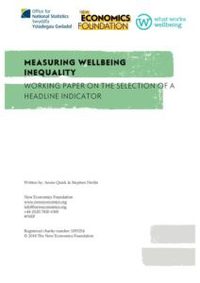Measuring wellbeing inequality
What are the appropriate indicators of wellbeing inequality?
17 May 2018
Policy makers and academics are increasingly interested in wellbeing inequality. The vast majority of academic studies into wellbeing inequality currently use standard deviation of personal wellbeing measures such as self-reported life satisfaction or happiness. However, there has so far only been limited debate on whether standard deviation is the most appropriate measure, and its choice is rarely justified.
This working paper presents research commissioned by the Office for National Statistics (ONS) and carried out by the New Economics Foundation (NEF) in collaboration with the What Works Centre for Well-being. NEF was tasked with exploring the strengths and weaknesses of different measures of wellbeing inequality and to make a recommendation of a measure which could be reported by the ONS alongside mean wellbeing.
We identified three distinct reasons why people cared about wellbeing inequality. These were:
- Dispersion aversion — that large differences in life experiences are inherently undesirable
- Suffering aversion — placing a special status on individuals experiencing wellbeing below a particular threshold
- Weighted universalism — valuing improvements in wellbeing for everyone, though with more value given to improvements in wellbeing for those at the bottom of the distribution
This paper aims to open up discussion about appropriate indicators of wellbeing inequality. Based on analysis so far, we propose using a threshold for a single national indicator. Further work is needed to identify which threshold to use, although interviewees suggested 4, 5 or 6 on a scale of 0 – 10.
However, different indicators may be used for different purposes. We encourage researchers to reflect on which wellbeing inequality measure they choose and for a broader debate between key stakeholders on appropriate wellbeing inequality measures for different purposes.
Campaigns Building a wellbeing economy
Topics Wellbeing







